Janja Garnbret and Tomoa Narasaki won the first Boulder World Cup of the season in Keqiao, China. Camilla Moroni and Sorato Anraku won the silver medals. Zhilu Luo and Hannes Van Duysen rounded out the podium, winning bronze medals.
Rain cancelled the Men’s Qualification round on Monday, causing the Men’s World Cup to be shortened to just include the qualification and semi-final rounds on Wednesday, with the semi-final functioning as a final. This happened last year at the Seoul World Cup when rain forced the organizers to shorten the event.
We saw new faces in both finals, with Erin McNeice (UK) and Zelia Avezou (France) reaching their first IFSC World Cup Final. Dayan Akhtar (UK) and Ram Levin (Israel) reached their first World Cup “Final” in the large 20-person final.
Women World Cup: How it Happened
The women’s field was missing the top talent apart from Janja Garnbret. 2023 Boulder World Cup Series winner Natalia Grossman and World Cup winners Brooke Raboutou and Oriane Bertone all skipped the event, leaving Janja Garnbret with little competition for the gold medal.
The semi-final round was a tough set of boulders, with only 13 tops across the 20 athletes. No athlete would top Boulder 2, a power boulder set on the steepest section of the wall on slopers. Garnbret got the closest, reaching the top hold several times but could not hold it. She would finish the semi-final in first place with 3 tops and 4 zones. Learn more about the routesetting behind Boulder 2 on the IFSC World Climbing Club Day #2.
The finalists were Janja Garnbret, 2021 Boulder World Championship silver medalist Camilla Moroni, World Cup bronze medalists Zhilu Luo and Anon Matsufuji, and newcomers Erin McNeice and Zelia Avezou.
The final's boulders started with a paddle dyno across a series of red slopers. Moroni was first out, and it took her six attempts to work out the paddle move before completing a second paddle dyno to the finish hold. Avezou would only take 5 attempts to top the boulder. Garnbret would stop mid-way through the paddle, claiming afterwards that “none of those were slopers”. She would go on to flash the boulder.
The second boulder was the easiest of the round, with only Avezou unable to top it. Luo, McNeice and Garnbret would all flash the boulder.
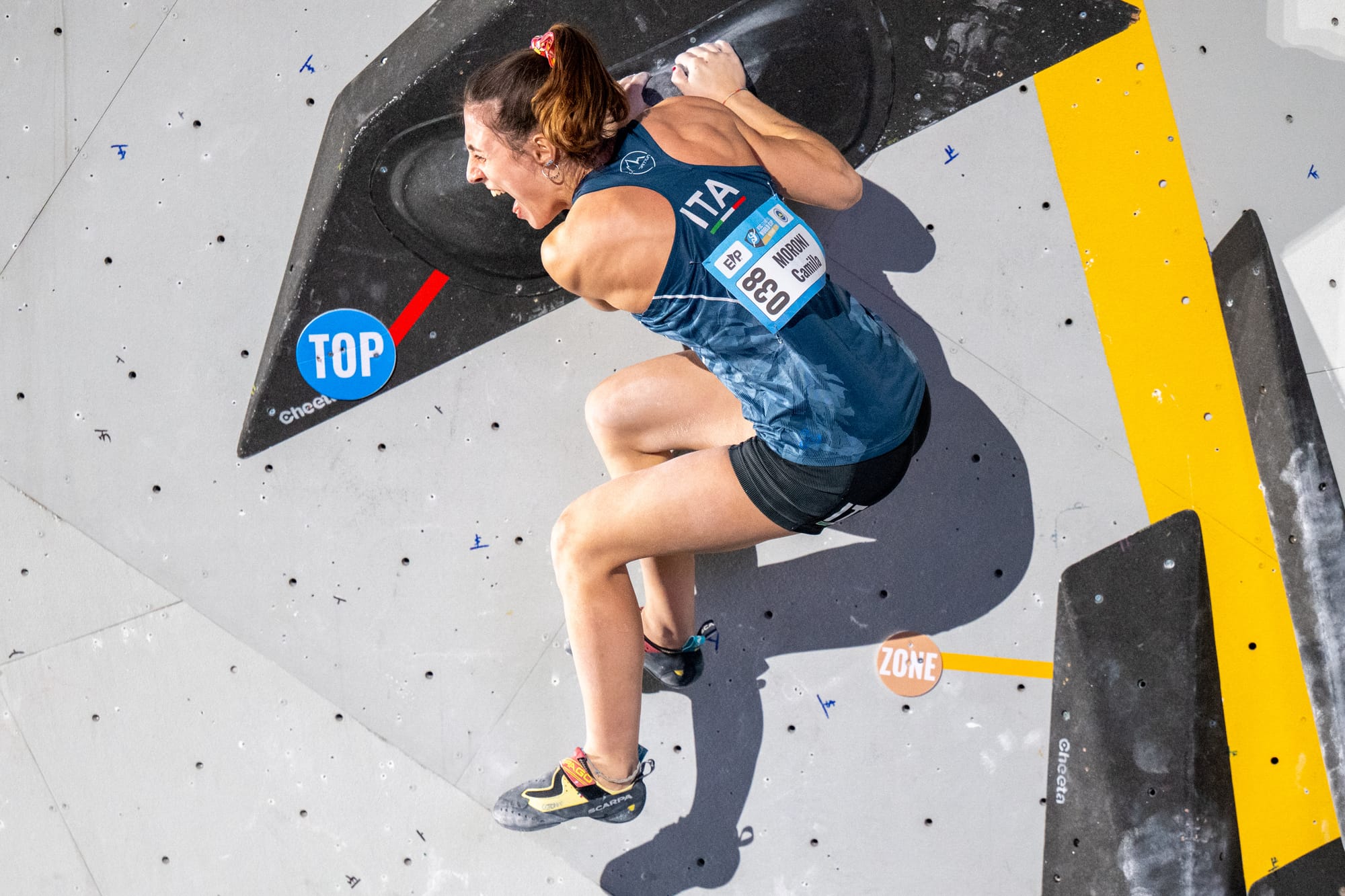
The third boulder was on the slab, requiring a tricky no-hand move to get stood up in the middle of the boulder. Only Luo and Garnbret would top the boulder.
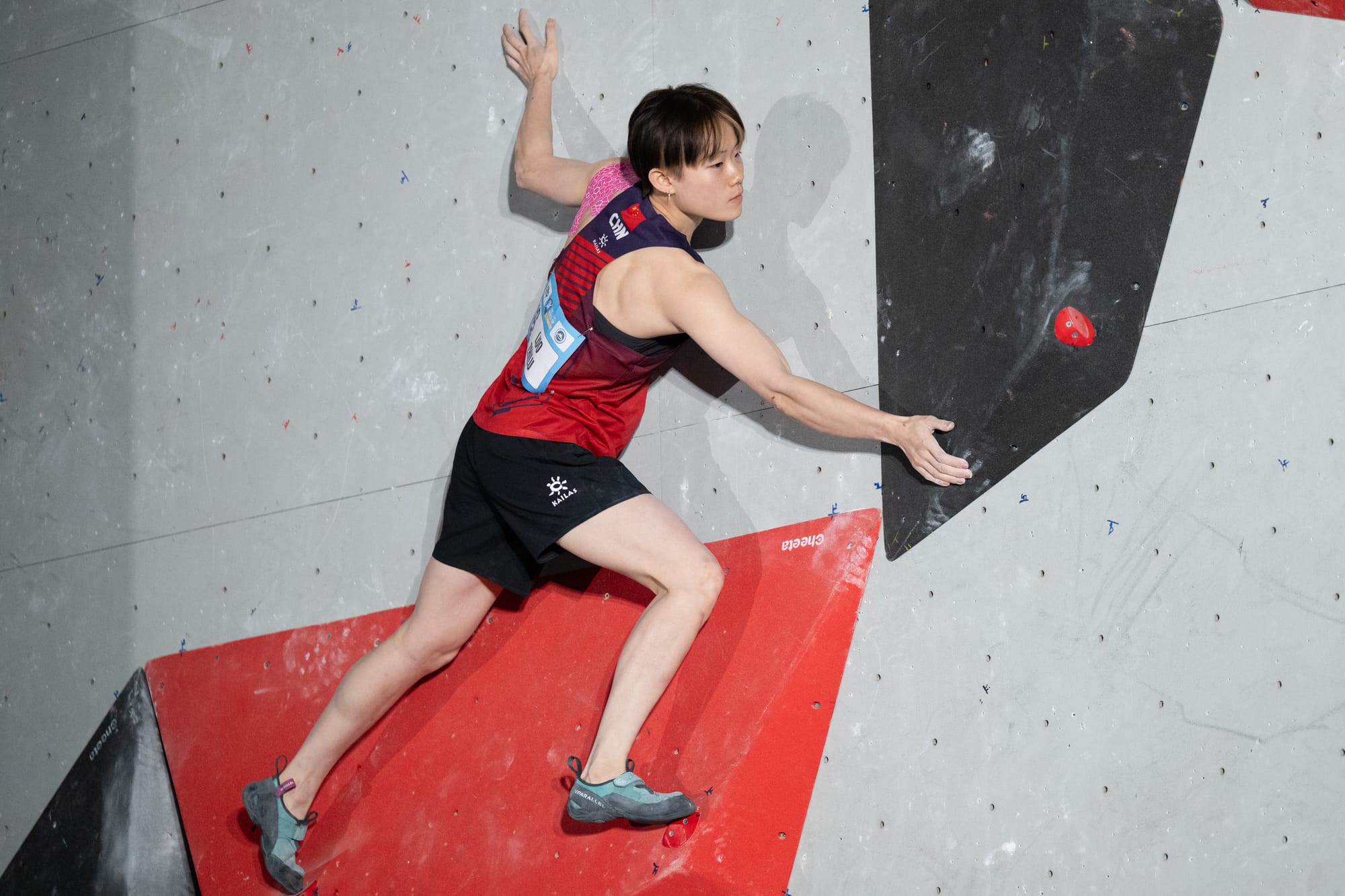
The fourth boulder was the most powerful boulder of the round and looked like it had been set to test Garnbert alone. The boulder was on the steepest part of the wall, starting with a press before going into a series of pinches to a small undercut for the zone. Athletes then crossed into a gaston before matching the large finish hold. No one reached the zone, and many struggled on the initial press move. Garnbret came out last and flashed it, looking composed and comfortable, like she was enjoying herself.
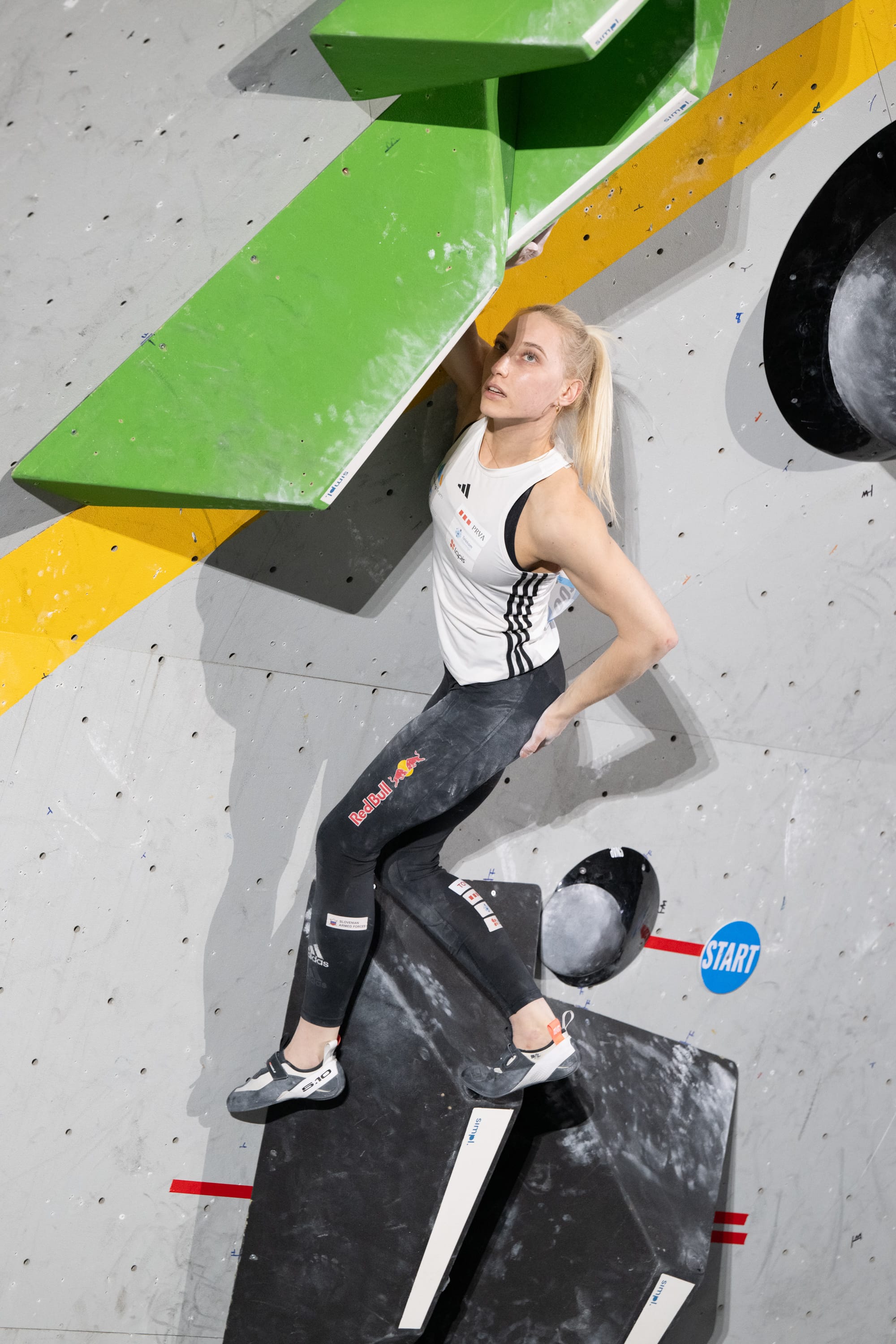
Garnbret commented after the event that.
“It’s the first World Cup of the season and you are always a little bit nervous because although I have been training hard over the winter you don’t really know what your competitors have been doing. I knew I was strong and I felt good, but you never know in a competition.”
“Today I really enjoyed myself and I climbed like I wanted to climb. I was calm, felt very confident, and I just enjoyed the atmosphere and the competition.”
Diving Deeper
Keqiao was Garnbret’s 16th Boulder World Cup Gold medal. It was also her 19th Boulder World gold medal (Boulder World Cup or World Championship), moving ahead of Sandrine Levet, who dominated the early 2000s in Lead and Boulder, winning 5 Boulder World Cup series and 18 Boulder World Cup Gold medals. Garnbret is still behind Boulder specialists Anna Stöhr and Akiyo Noguchi in the all-time list of World Cup Gold medal winners.
Camilla Moroni became the 4th Italian woman to win a World Cup medal after Giulia Giammarco, Jenny Lavarda, and Stella Marchisio. It has been nearly 20 years since Giammarco won her second silver medal in Bardonecchia in August 2004. Though Moroni had previously won the Boulder silver medal at the World Championship in 2021 and the Italian Championship 5 times, this was only her third Boulder World Cup final.
Zhilu Luo won her second Boulder World Cup bronze medal. Her first was in Brixen back in 2022 at her first-ever World Cup. She is the only Chinese athlete, male or female, to win a Boulder World Cup medal.
Erin McNiece is the 4th Great British woman to reach a Boulder World Cup final after Shauna Coxsey, Audrey Seguy and Claire Bell.
Women Results
| Ranking | Athlete | Country | Score |
|---|---|---|---|
| 1 | Janja Garnbret | Slovenia | 4T4Z 5 5 |
| 2 | Camilla Moroni | Italy | 2T3Z 10 13 |
| 3 | Zhilu Luo | China | 2T2Z 2 2 |
| 4 | Zelia Avezou | France | 1T3Z 5 15 |
| 5 | Erin McNeice | UK | 1T2Z 1 6 |
| 6 | Anon Matsufuji | Japan | 1T2Z 2 4 |
Boulder World Cup Series Ranking
| Ranking | Athlete | Country | Ranking Points |
|---|---|---|---|
| 1 | Janja Garnbret | Slovenia | 1000 |
| 2 | Camilla Moroni | Italy | 805 |
| 3 | Zhilu Luo | China | 690 |
| 4 | Zelia Avezou | France | 610 |
| 5 | Erin McNeice | UK | 545 |
| 6 | Anon Matsufuji | Japan | 495 |
| 7 | Madison Richardson | Canada | 455 |
| 8 | Chloe Caulier | Belgium | 415 |
| 9 | Staša Gejo | Serbia | 380 |
| 10 | Oceana Mackenzie | Australia | 350 |
Men World Cup: How it Happened
Men’s qualification was cancelled halfway through due to rain on Monday. The qualification round was then re-run on Wednesday with completely new boulders. The round was also televised, which rarely happens as qualification rounds take a long time - Keqiao’s took 3 hours and 55 minutes for all 67 athletes competing to finish, even after splitting into 2 groups.
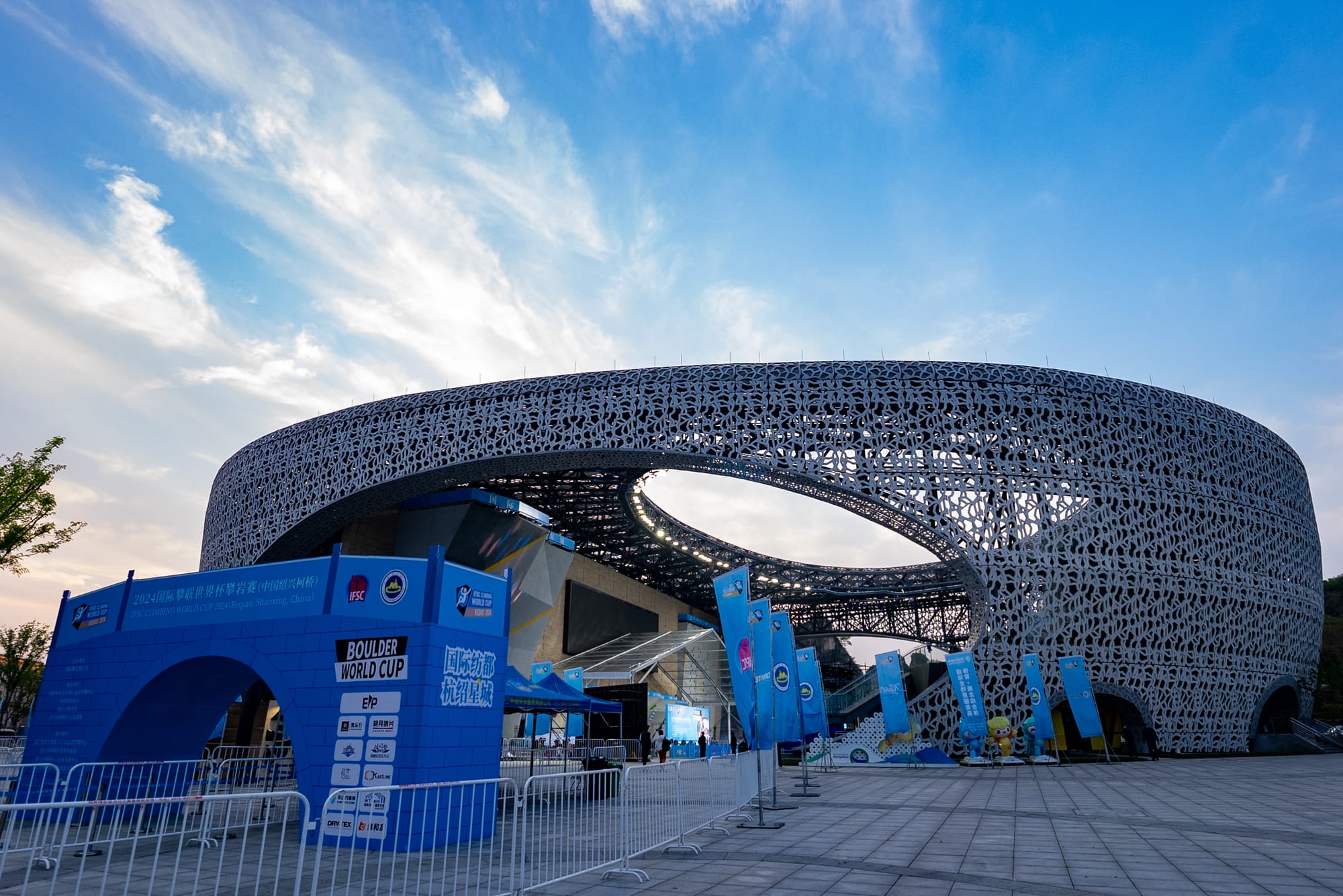
The athletes were split into two groups, A and B, and the top 10 from each would go into the final. Japan dominated the round, with 6 men reaching the final, including 5 in the top 10. Toby Roberts and Sorato Anraku won each of their respective groups. Ram Levin and Dayan Akhtar reached their first IFSC World Cup Finals. For Levin, it was his 26th World Cup after starting competing on the World Cup circuit eight years ago.
The final consisted of 20 men and was run following the semi-final format. The final looked tough to start as the early athletes came out, and it stayed tough, with the top-seeded athletes still struggling on boulders 2 and 3.
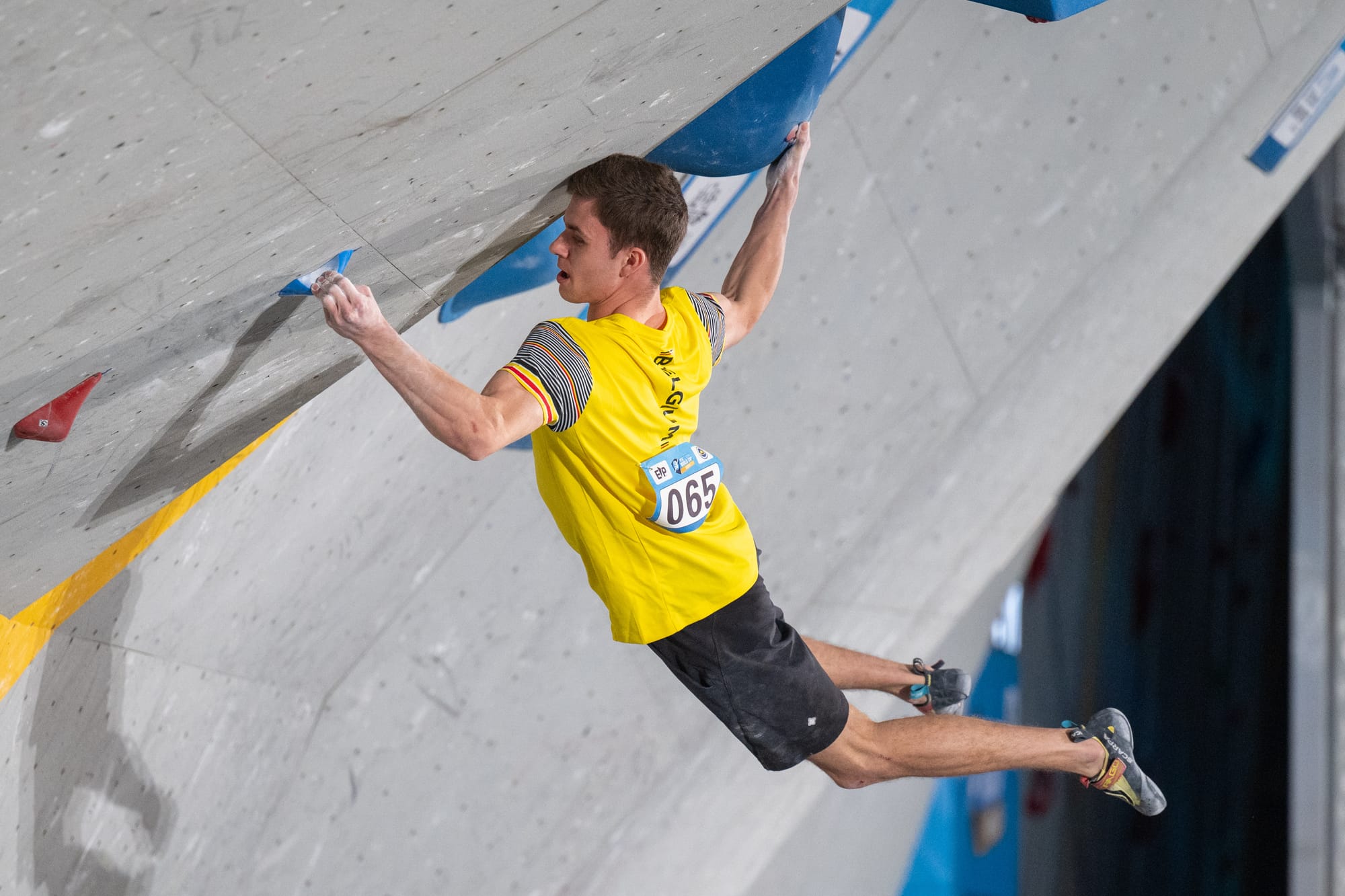
No one would top Boulder 2, and only Sorato Anraku and Jongwon Chon would top Boulder 3.
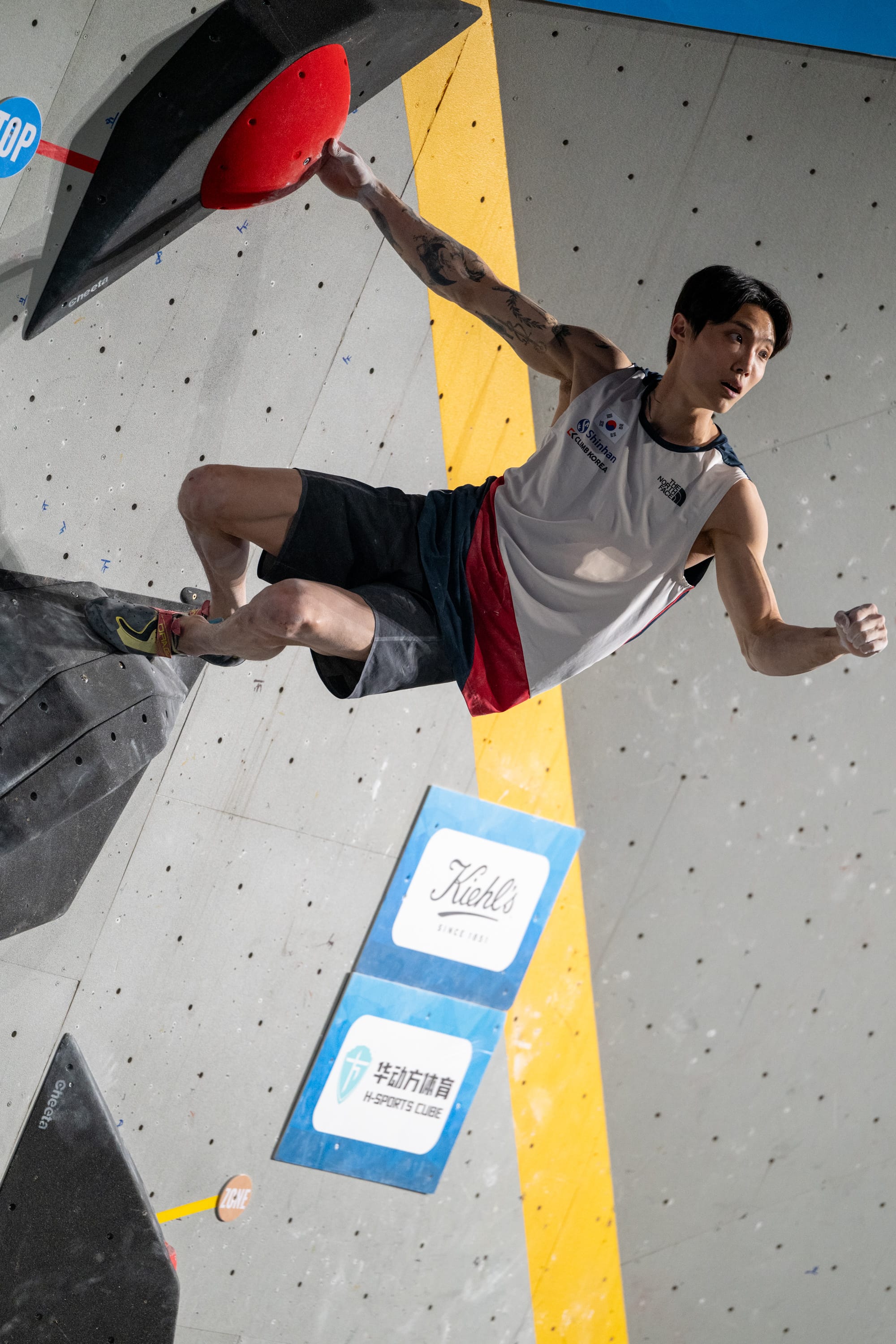
The fourth boulder on the slab would be where the competition would be decided after 14 topped the first boulder, including 8 flashes.
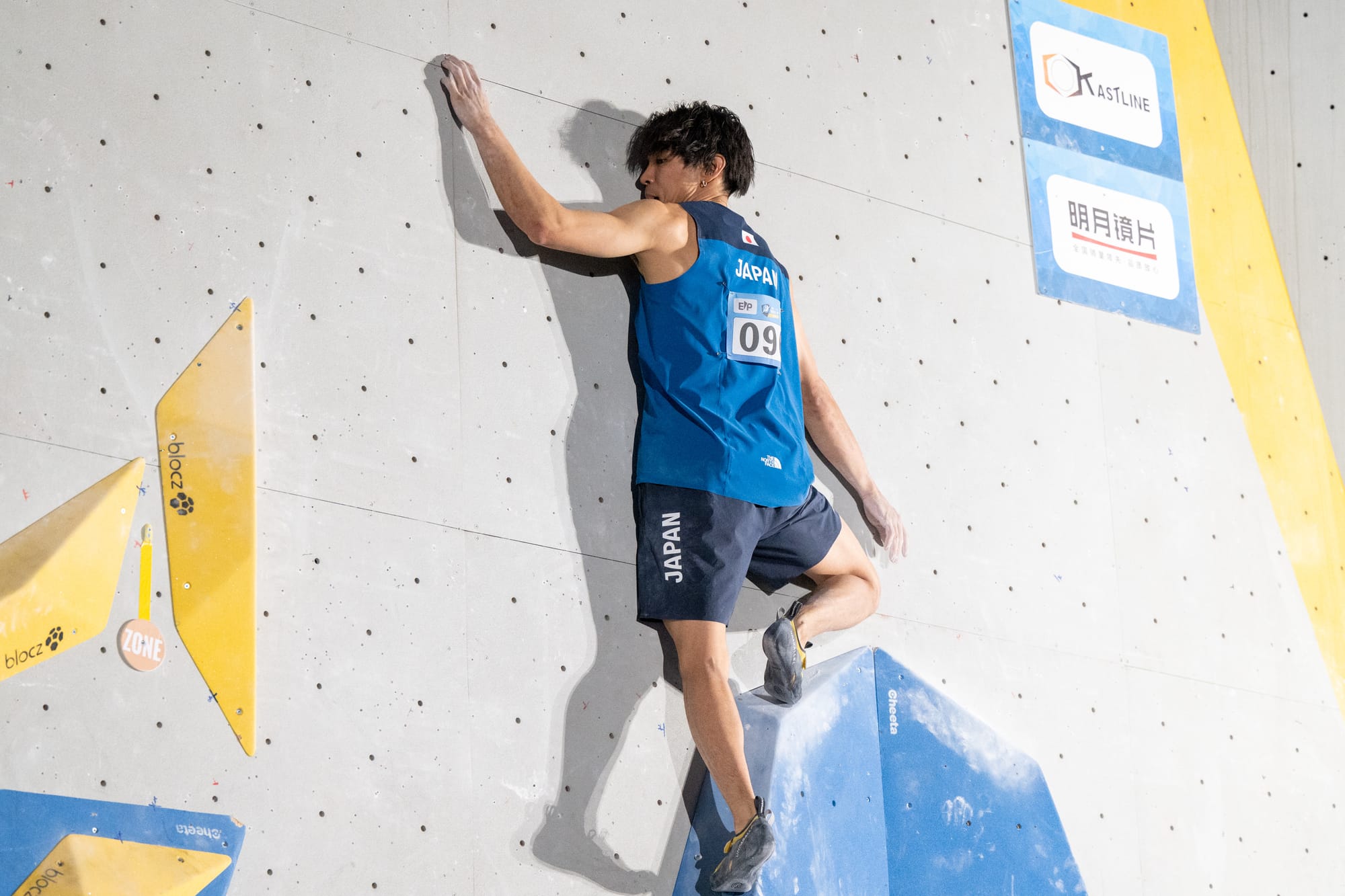
Narasaki and Van Duysen would quickly top the slab, which proved crucial as Anraku did not. He looked confused at how to move past the zone and started trying to move dynamically. Narasaki and Anraku would reach all 4 zones, securing themselves the top two positions. Narasaki won as he topped his two boulders faster.
Van Duysen got the zone on Boulder 2 and Boulder 4 on his first attempt, which pushed him into third place ahead of Toby Roberts by two attempts to zone. Roberts took two attempts to reach the zone on Boulder 3 and three on Boulder 4, but he did not manage to get the zone on the physical second boulder.
Narasaki said after the competition “I’m happy to take the win. It’s important to get focussed on the Olympic Games and it starts now with this win. I just have to continue training now for the Games.”
Diving Deeper
Narsaki’s win in Keqaio was his 7th World Cup win. His first win was in Chongqing 8 years ago. Narasaki is now the 4th most successful World Cup boulderer by World Cup gold medals behind Kilian Fischhuber (21), Dmitrii Sharafutdinov (12) and Jérôme Meyer (11). He now moves ahead of Adam Ondra, Jan Hojer and Rustam Gelmanov.
Sorato Anraku’s silver medal was his 3rd Boulder World Cup medal and 7th medal across Boulder and Lead.
Van Duysen’s bronze medal was his 2nd Boulder World Cup medal after winning a silver in Hachioji last year. He is the only male Belgian athlete to win a World Cup medal. The only other Belgian athlete to win a Boulder World Cup medal was Chloé Graftiaux, who won 2 gold, 2 silver and 2 bronze across 2007 and 2010. She died tragically in 2010 on the Aiguille Noire de Peuterey in the Mont Blanc Massif.
Keqiao Men Results
| Ranking | Athlete | Country | Score |
|---|---|---|---|
| 1 | Tomoa Narasaki | Japan | 4T4Z 5 5 |
| 2 | Sorato Anraku | Japan | 2T3Z 10 13 |
| 3 | Hannes Van Duysen | Belgium | 2T3Z 4 4 |
| 4 | Toby Roberts | UK | 2T3Z 4 6 |
| 5 | Sam Avezou | France | 2T3Z 5 6 |
| 6 | Meichi Narasaki | Japan | 2T2Z 3 3 |
| 7 | Jongwon Chon | South Korea | 1T4Z 2 6 |
| 8 | Jakob Schubert | Austria | 1T4Z 2 8 |
| 9 | Max Milne | UK | 1T3Z 1 6 |
| 9 | Jan-Luca Posch | Austria | 1T3Z 1 6 |
| 9 | Anže Peharc | Slovenia | 1T3Z 1 6 |
Boulder World Cup Series Ranking after Keqiao
| Ranking | Athlete | Country | Ranking Points |
|---|---|---|---|
| 1 | Tomoa Narasaki | Japan | 1000 |
| 2 | Sorato Anraku | Japan | 805 |
| 3 | Hannes Van Duysen | Belgium | 690 |
| 4 | Toby Roberts | UK | 610 |
| 5 | Sam Avezou | France | 545 |
| 6 | Meichi Narasaki | Japan | 495 |
| 7 | Jongwon Chon | South Korea | 455 |
| 8 | Jakob Schubert | Austria | 415 |
| 9 | Max Milne | UK | 351.66 |
| 9 | Jan-Luca Posch | Austria | 351.66 |
| 9 | Anže Peharc | Slovenia | 351.66 |





